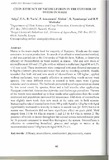Efficacy of nicosulfuron in the control of weeds in maize

View/
Date
2011-09Author
Michieka, R.W.
Nyankanga, R.
Kirimi, Z.
Amuyunzu, P.
Narla, R.
Ariga, E.S.
Language
enMetadata
Show full item recordAbstract
Maize is the main staple food for majority of Kenyans. Weeds are the major
constraint in maize production. In search of an effective weed control method,
a trial was carried out at the University of Nairobi farm, Kabete, to determine
efficacy of Nicosulfuron in weed control in maize. Old and new stock of
nicosulfuron at 100 and 125 g/ha with or without a surfactant (Agra190 at 0.2%
v/v) was used. These treatments were compared with post directed paraquat at
0.5kg/ha (farmer'S practice) and weed free and no weeding controls. Results
revealed that both old and new stock of nicosulfuron at 100 kgha-', applied
without surfactant, were equally effective in controlling weeds across weed
species. The most difficult weeds to control in both cases were Cyperus
rotundus and esculentus. The herbicide prevented weed regeneration as shown
by low weed count, by species, three and a half months after application.
Paraquat controlled Amaranthus hybridus and Galinsoga parviflora. The rest
of the weeds were scorched up to four weeks after application then the weeds
recovered and population increased till senescence. Old stock ofnicosulfuron
was slightly more toxic than new stock at the same rate in both seasons.
Increasing the rate ofnicosulfuron from 100 g with Agral to 125g/ha with Agral
significantly increased its toxicity to maize in season two (p< 0.05) but not in
season one. Treatments did not have significant effect on grain yield. Yield
ranged from 3.0 to 4.6 t/ha in season 1 and 2.5 to 4.4 t/ha in season 2. The
presence of weeds in maize throughout the second season reduced maize yield
by 36 percent compared to weed free throughout the season. Nicosulfuron is
effective in controlling broadleaf, grasses and sedges in maize at the
recommended rate of 1OOg/hawith Agral90 0.2% v/v.
Citation
Optimimization of Agricultural Value Chains for sustainable DevelopmentSponsorhip
National Council of Science and Technology, The Kenya Seed CompanyPublisher
Faculty of Agriculture, University of Nairobi
Description
aGRO 2011 biennial conference presentation
